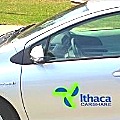- By -Staff
- Around Town
 Print
Print  On December 2, 2013, the Internal Revenue Service determined that Ithaca Carshare provides educational and charitable benefits, lessens the burden of government, and therefore qualifies for the federal 501(c)3 tax exemption. The organization filed for exemption in August 2007, over six years ago. With this recent decision, Ithaca Carshare is eligible to apply for funding from private foundations, and able to accept tax-deductible donations from the public.
On December 2, 2013, the Internal Revenue Service determined that Ithaca Carshare provides educational and charitable benefits, lessens the burden of government, and therefore qualifies for the federal 501(c)3 tax exemption. The organization filed for exemption in August 2007, over six years ago. With this recent decision, Ithaca Carshare is eligible to apply for funding from private foundations, and able to accept tax-deductible donations from the public. Since 2008, Ithaca Carshare has offered local community members self-serve access to vehicles when needed, without the high cost of vehicle ownership. Their transit-oriented model makes independent transportation affordable to more people, supports bus riding, bicycling and walking, and is also a reliable back-up for carpoolers and single car families. “Being a part of Ithaca Carshare and not owning a car has simplified my life more than I had ever imagined it would,” said member LeBron Rankins.
Ithaca Carshare is governed by a six person board of community members who guide carsharing operations and link the organization with other transportation, environmental and equity-focused organizations, as well as local government and higher education institutions. Ithaca Carshare employs six local individuals and has been a certified Living Wage employer since its inception. At launch in 2008, six cars and a pickup truck served about 60 members. Now five and a half years later, over 1400 members share a fleet of 25 vehicles, including a minivan and pickup truck.
A 2010 study by Timon Stasko, a Cornell graduate student, indicated that Ithaca Carshare has helped reduce car ownership in Ithaca by around 380 vehicles. Just like public transportation helps reduce congestion, “Ithaca Carshare has helped relieve parking pressure downtown and in Collegetown, reduced the number of student vehicles, and reduced local businesses’ cost for delivery vehicles,” says Operations Director Anna Cook. “We are thrilled to finally be officially recognized for our contribution to the community and to be able to receive grants and tax-deductible donations to support our work,” says board chair Fernando De Aragon.
As part of efforts to provide transportation solutions to people in need, Ithaca Carshare created the Easy Access program as an affordable option for low-income community members. Executive Director Jennifer Dotson explains, ”We do the Easy Access plan by matching our funds with federal funds, and are proud to say over 50 people who otherwise wouldn't be able to afford it are able to travel to activities that just aren’t accessible with TCAT, walking or biking.” The organization currently receives no other direct governmental support in their $400,000 budget. In 2006, start up funds were provided by a New York State Energy Research & Development Authority/New York State Department of Transportation grant.
v9i48



